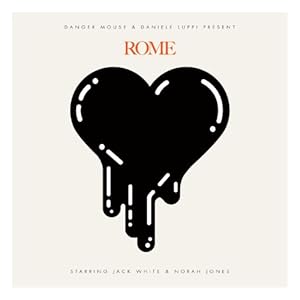The good, the bad and Jack WhiteHe and Norah Jones lend their talents in homage to Spaghetti Western music
May 30, 2011
By Chris Talbott, Associated Press

It seems just right that the making of "Rome," Daniele Luppi and Danger Mouse's homage to Italian film soundtracks, should unfold like one of those old movies that still fascinate decades later.
The screenplay would start with Luppi, the Los Angeles-based Italian composer who scores films, and Brian Burton, the outrageously creative producer known as Danger Mouse, driving around the streets of Rome, bartering for the use of vintage gear from the 1960s. They needed to match instruments and equipment used by the masters like Ennio Morricone in films by Federico Fellini and Sergio Leone and others.
Luppi would knock on a door not knowing who he would meet. One time it was an 80-year-old man in his pajamas. The next a Vespa mechanic.
"He was wearing a jumpsuit and all that," Luppi said. "In between Vespa parts and stuff like that, he had vintage microphones and guitars. It's really weird. At the end of this meeting, he actually came up to me with a microphone and said, 'I stole this from Ringo Starr when The Beatles played in Rome. ...' So we had these characters. It was almost a Felliniesque experience."
Luppi and Burton outfitted their project, hired vintage musicians to go with the vintage instruments and reassembled the surviving members of Alessandro Alessandroni's Cantori Moderni, the choral group heard in Spaghetti Westerns like "The Good, the Bad and the Ugly."
After recording the basic instrumental tracks they added a male star, the at-turns menacing and conflicted Jack White. They asked Norah Jones to be their femme fatale.
Jones was drawn to the project because of its unique approach and the chance to work with Burton and White.
Though there's no script or story on "Rome," released May 17, Jones and White take on personas through their songs.
White saw the possibility to create complex characters with his three entries, and seems to play the victim to Jones' heartbreaker. His doubletracked vocals on "The Rose With the Broken Neck" add a strange sense of loneliness. He mirrors the interior conflict in those Spaghetti Western heroes of yore on "Two Against One" and is left to bleed to death of a broken heart on album-ending "The World."
"I did write the lyrics to the songs, but I forgot to tell Brian what they were about," White joked in an e-mail. "Probably some girl."
Once White, a fan of Italian film scores "and sometimes Italian women," made his contributions, Burton finished off the parts that would go to Jones and a project that seemed to take forever finally wound down after five years and three trips to Italy.





